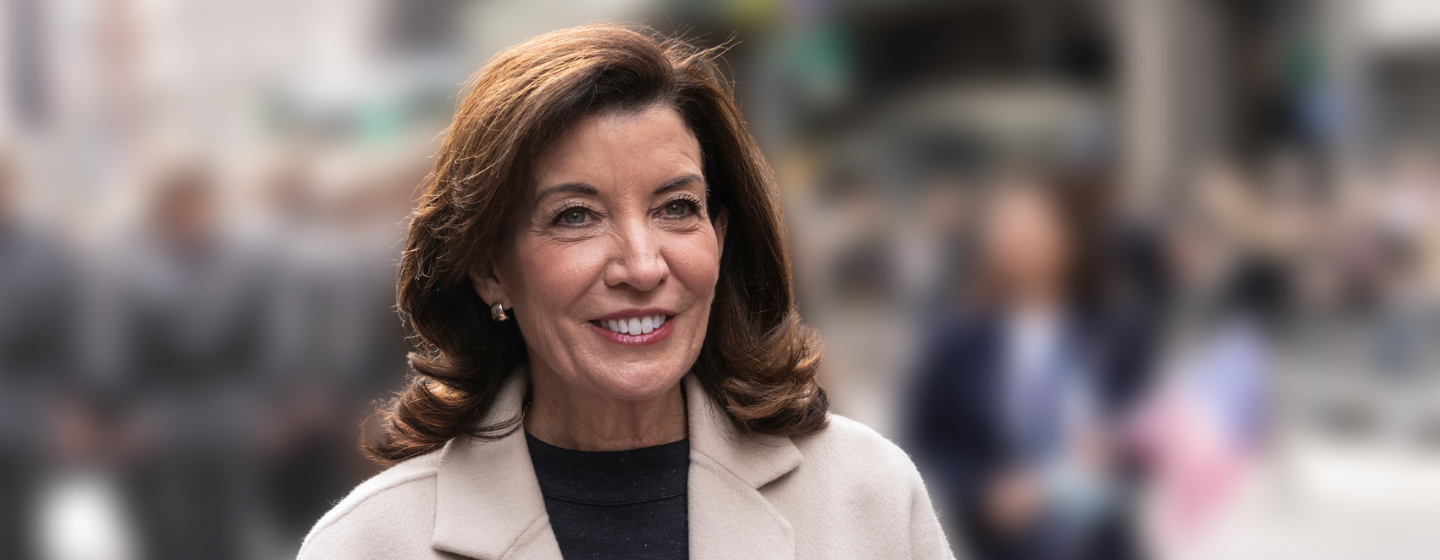What to Expect in Governor Kathy Hochul's State of the State

Dan Clark: We're now less than a month out from Governor Kathy Hochul's ‘State of the State’ address, and we already have some clues on what will be in it. Hochul joined New York City Mayor Eric Adams at an event this week put on by the group A Better New York, an economic development nonprofit, where the two laid out a few ideas for boosting the city's economy and culture, however, both said that's easier said than done. New York City still has not fully recovered the number of jobs lost during the pandemic according to the state's Department of Labor, but as those jobs begin to slowly come back New York faces another problem. It's a housing crisis, something which Hochul says she'll have a plan for next month.
| GOV. KATHY HOCHUL | "So the jobs are there, the housing's not. That's why in my upcoming 'State of the State' address I will put forth a comprehensive housing plan and within this, it will include the building of 800,000 new units of housing over the next decade, and I want to make it sooner than that." |
DC: On Thursday, Hochul spoke to reporters at the State Capitol. For more on that, I sat down with Josh Solomon from the Times Union. Josh, thank you for coming in.
Josh Solomon: No problem.
DC: So the Governor was talking about a lot of different things. It was a combo winter storm warning and a reflection on her first 18 months or so in office. You asked her about something about good cause eviction. It's a little bit more complicated than I want to get into on the air, but it's a bill that would basically force landlords to have a good cause to evict someone and those causes are listed in the legislation. Any indication on where she stands?
JS: She was very committed to not committing on the issue. Which she typically does on legislation. So it's not out of the ordinary for her to kind of avoid taking a hard stance. But we know that the reason it's important to find out where she stands on it is that we know this is going to be the most important piece of legislation for progressives, and following an election, where progressives weren't necessarily motivated to go out and vote and the Governor's figuring out how to make her coalition in the legislature and they still have super majorities, it's going to be interesting to see how much she gives room to a piece of legislation that progressives love. And the big piece of it that is controversial, some would argue, is that it includes a piece of rent stabilization in it, which proponents of it say no, but that's kind of where it becomes really difficult.
DC: Right, this has been a few years of trying to negotiate a very thin line between what property owners like about it. they don't really like anything about it, and what renters like about it, particularly progressives. That's just one of these housing issues for her 'State of the State' that I want to get into a little bit. Before we got on the air, you mentioned that she doesn't mention a lot about affordable housing just yet. I'm really curious because last year, in her 'State of the State', she made a very big focus on housing in terms of affordable housing, supportive housing, and I'm curious about where she takes from it here. Anything in your crystal ball?
JS: Well, the Governor during a housing conference speech a couple of weeks ago in Manhattan gave what she called a trailer to the movie, and the movie being the 'State of the State' on January 10th. She said repeatedly, housing is going to be the top priority. At this speech, she started off by saying, last year we did $25 billion over 5 years for 100,000 homes but specifically under the umbrella of affordable housing. Now we're talking about broad-sweeping housing policy, anywhere from creating a state office to help with planning for housing and have more of a comprehensive look at it, to zoning in the suburbs which they're particularly concerned about in terms of the rate of building housing. So not only are they concerned about the building of housing and the zoning behind it, but they're also concerned about access to that housing for whom, how, workforce housing, the whole gamut. I mean, we're going to really see a big pitch on it.
DC: When you talk about housing in the suburbs, does that include accessory dwelling units Which is basically the option for somebody to convert their property into a home for somebody. A lot of people use the example of an aging parent who needs somewhere to live. That got into a little bit of a mess last year. I don't really know what's up with it. Have you covered that?
JS: I have, and if you hear the words ADU, Accessory Dwelling Unit, know that you're hearing a very politically charged term.
DC: I didn't know about this until before last year. I didn't know that it was so controversial. Why is it controversial?
JS: Well, there seems to be some distaste in the suburbs. Particularly in Westchester and Long Island, of do we allow this, and rather, who should allow it? It really goes back to the question of home rule on zoning and whether or not the state should change its policy on, is the state going to say this is allowed by right, because we're so concerned about the threat of a housing crisis that we need to create more housing. Whether it be for a grandmother, for a recent college grad, or for, you know, a young person coming to the community and wanting to commute into the city through Metro North or something, right? It may less be that is the issue and it's more so, we should decide it. Let us decide home by home by home at local zoning boards, local planning boards, and that's how we control what our community looks like and that's what we pay taxes for, and that's what we deserve a right to do.
DS: It's an interesting issue and it came up and it seemed to be getting some steam last year and it was like tennis. The ball came over and the interest against it vanished very quickly last year. It was just one of those things that Hochul seemed to go really strong on and then kind of abandoned at the wayside. The Governor made some interesting comments regarding the state's finances heading into next year as well, saying that, last year it was looking good, this year we don't really know. What do you get from that?
JS: Well, she took a lot of heat from progressives last year. Who wanted her to spend down all of the one-time money that they were getting from the federal government on really important issues from home care to health care to child care. She spent some of the money on it but not all of it. She kept some in reserves, and it’s that reserve money, what the Governor is saying so far, is hopefully going to pad the landing regarding any potential mild recession, and they're hoping that will prevent them from having to institute a tax hike or something of that nature. But it's still very early.
DC: Right. I don't remember quite how she phrased it, but she did say that she does not foresee any tax increases which will probably upset progressives who are looking for higher taxes on the wealthy. We will get into later in the show, so stick around. For now, thank you so much, Josh Solomon from the Times Union. We'll leave it there.
This interview is a transcript of the original broadcast version of this conversation and has been edited for clarity.
Watch the Interview
New housing plan, new chief judge, WFP election strategy, examining NY's "Bottle Bill."
Explore More




